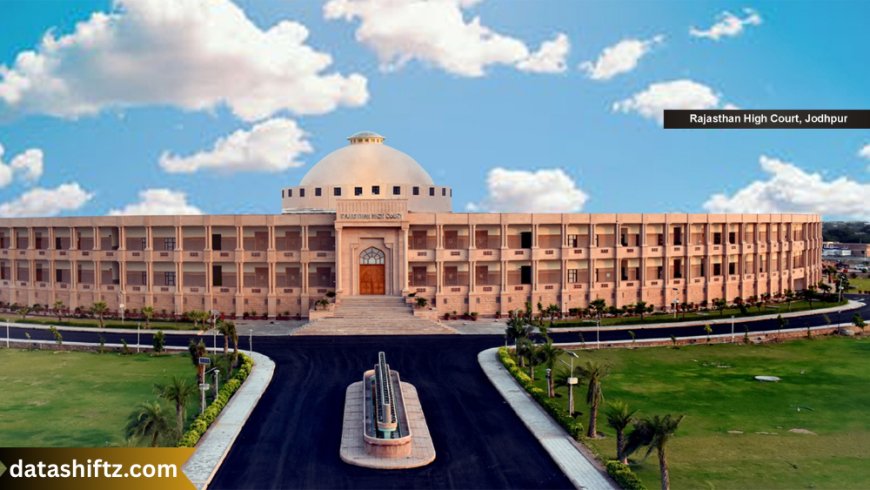Rajasthan High Court: An In-Depth Overview of the Judicial Pillar of Rajasthan

Introduction
The Rajasthan High Court stands as the apex judicial authority in the state of Rajasthan, India. Established to administer justice and uphold the rule of law within the state, the High Court plays a critical role in interpreting laws, safeguarding constitutional rights, and ensuring fair governance. Since its inception, the Rajasthan High Court has grown in stature, jurisdiction, and influence, addressing a vast spectrum of civil, criminal, constitutional, and administrative matters.
This article offers a detailed insight into the history, structure, functioning, and significance of the Rajasthan High Court. We will explore its origin, jurisdictional powers, bench compositions, and key roles in the state's judicial landscape.
History and Establishment of Rajasthan High Court
Formation and Evolution
The Rajasthan High Court was established on June 29, 1949, following the integration of princely states that formed Rajasthan. Initially, the judicial needs of the state were managed through various princely courts. However, the need for a unified judicial body led to the formation of the High Court, consolidating legal authority in the region.
Key milestones in its evolution include:
-
1949: Rajasthan High Court established at Jaipur.
-
1956: Reorganization of states and adjustment of jurisdictional boundaries.
-
1977: Infrastructure expansion with the construction of a new building.
-
Present: Continues to expand its digital and infrastructural facilities to increase access to justice.
Architectural Significance
The Rajasthan High Court is housed in a grand building in Jaipur, known for its impressive blend of traditional Rajput and Mughal architectural styles. The courthouse is not just a center of justice but also a cultural landmark, symbolizing the judicial heritage of Rajasthan.
Jurisdiction and Powers of Rajasthan High Court
Types of Jurisdiction
The Rajasthan High Court exercises various types of jurisdiction as per the Constitution of India:
| Jurisdiction Type | Description |
|---|---|
| Original Jurisdiction | Authority to hear cases first, primarily in civil and criminal matters involving the state government. |
| Appellate Jurisdiction | Power to hear appeals against lower courts and tribunals within Rajasthan. |
| Writ Jurisdiction | Empowered under Article 226 of the Constitution to issue writs for enforcing fundamental rights. |
| Supervisory Jurisdiction | Oversight of subordinate courts and tribunals to ensure proper functioning and legal conformity. |
Powers and Functions
-
Judicial Review: The High Court can review laws and executive actions to ensure they conform with the Constitution.
-
Public Interest Litigation (PIL): It accepts PILs to address matters of public concern, ensuring wider access to justice.
-
Contempt of Court: Maintains the dignity of the judiciary by punishing contemptuous acts.
-
Administration of Justice: Facilitates the timely and fair disposal of cases, contributing to the rule of law.
Composition and Bench Structure of Rajasthan High Court
Judges and Appointment Process
The Rajasthan High Court comprises several judges appointed as per the guidelines in the Constitution of India:
-
Chief Justice: The highest-ranking judicial officer of the court.
-
Permanent Judges: Serve until the age of 62.
-
Additional Judges: Appointed temporarily based on workload.
Appointment Process:
-
Recommendations by the Collegium System, which includes the Chief Justice of India and senior Supreme Court judges.
-
Approval by the President of India.
-
Formal appointment and oath-taking ceremonies.
Bench Configurations
-
Single Judge Bench: Hears cases requiring speedy disposal or less complex matters.
-
Division Bench: Comprises two judges hearing appeals and significant cases.
-
Full Bench: Consists of three or more judges, primarily for important constitutional questions.
Important Functions and Roles of Rajasthan High Court
Role in Protecting Fundamental Rights
The Rajasthan High Court plays a vital role in safeguarding the fundamental rights of citizens. Under Article 226 of the Indian Constitution, it has the authority to issue writs like habeas corpus, mandamus, prohibition, certiorari, and quo warranto. These writs serve as powerful tools to check arbitrary government actions and protect individual freedoms.
Public Interest Litigation (PIL)
The court has been proactive in accepting PILs, allowing socially relevant issues such as environmental protection, human rights, and governance reforms to be addressed through judicial intervention. This has made the judiciary more accessible to marginalized and underrepresented sections of society.
Administrative Setup of Rajasthan High Court
Key Offices and Departments
The court's administrative functions are supported by various offices and officials, including:
| Department | Role and Responsibilities |
|---|---|
| Registrar General | Overall administration and record management |
| Judicial Officers | Case management and judicial proceedings |
| Administration Branch | Human resources, finance, and infrastructure |
| Computerization Cell | Technology adoption and e-court facilitation |
E-Courts Initiative
To enhance efficiency, the Rajasthan High Court has implemented the e-Courts system, which digitizes case records, hearing schedules, and filing processes. This initiative improves transparency, reduces delays, and makes judicial services more user-friendly.
Challenges and Future Outlook
Current Challenges
-
Case Backlogs: Like many courts in India, Rajasthan High Court faces significant case backlogs.
-
Infrastructure Needs: Although improved, further modernization is needed to handle increasing caseloads.
-
Access to Justice: Remote and rural populations still face difficulties in accessing court services.
-
Technological Gaps: Full digital adoption is ongoing, requiring training and infrastructure upgrades.
Future Prospects
-
Expanding the number of judges to reduce pendency.
-
Strengthening alternative dispute resolution mechanisms.
-
Enhancing legal aid and outreach programs.
-
Further integration of technology for virtual hearings and case management.
Key Facts about Rajasthan High Court
-
Established: June 29, 1949
-
Location: Jaipur, Rajasthan
-
Judges Strength: Approx. 50+ judges
-
Chief Justice: Appointed by the President of India
-
Jurisdiction: Entire state of Rajasthan
-
Major Bench Types: Single Judge, Division Bench, Full Bench
-
Languages Used: Hindi and English
-
Notable Cases: Landmark rulings on environmental law, fundamental rights, and land disputes.
Conclusion
The Rajasthan High Court is a pillar of justice, playing an indispensable role in the state's legal and constitutional framework. Its evolution from a modest establishment to a modern judicial institution reflects the dynamic legal landscape of Rajasthan.
By continuously adapting to new challenges and embracing technological advancements, the High Court strives to uphold the ideals of justice, fairness, and rule of law. For citizens, legal practitioners, and the government alike, the Rajasthan High Court remains a beacon of hope and authority in ensuring justice is accessible to all.






























